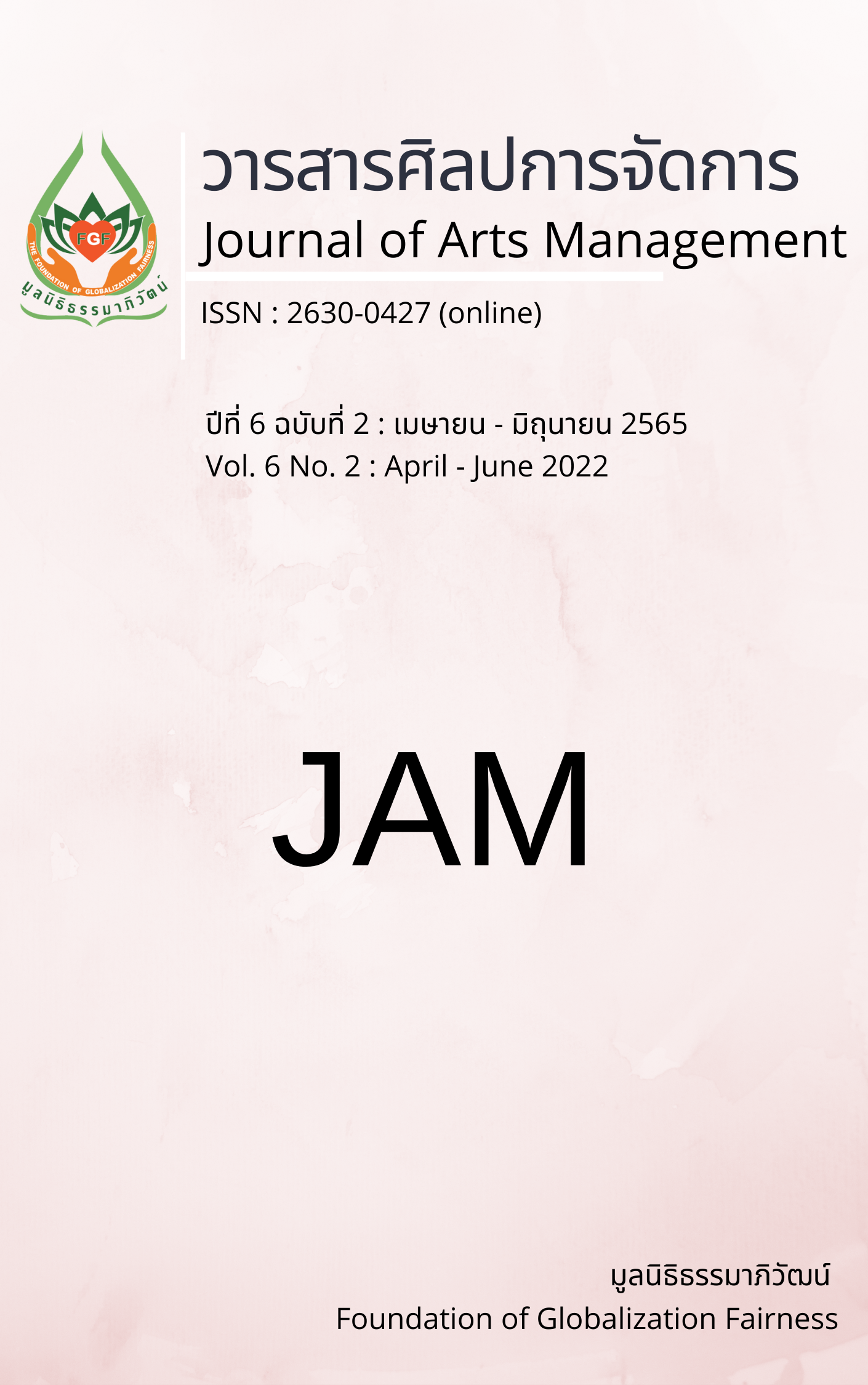Service Quality Factors Affecting Satisfaction of Marathon Participants: The Case of Small-Scale Marathon Events
Main Article Content
Abstract
This article aimed to 1) study perceived service quality affecting satisfaction and 2) compare satisfaction of small-scale marathon events of marathon participants classified by gender, age, income, distance, and competition experience. This research was quantitative research and employed the questionnaire with a reliability value at 0.861. The data were collected from 440
small-scale marathon participants in Bangkok and Perimeter divided into 75 each province. The data were analyzed by using descriptive statistic to study frequency percentage mean and standard deviation and using inferential statistic consisting of t-test and F-test to compare satisfaction of participants with different groups. Furthermore, using Multiple Regression Analysis to study perceived service quality affects satisfaction.
The research results were found: 1) marathon participants with different groups of age and competition experience had satisfaction differently with the statistical significance at .05, F=2.452 and F=4.483. Moreover, service quality affected satisfaction of small-scale marathon participants with a statistical significance at .05 for facility, information, and outcome. There was only one interaction that did not affect satisfaction. All these factors had the potential to explain the effect on satisfaction at 57.8%.
Article Details

This work is licensed under a Creative Commons Attribution-NonCommercial-NoDerivatives 4.0 International License.
Views and opinions appearing in articles in the Journal of Arts of Management It is the responsibility of the author of the article. and does not constitute the view and responsibility of the editorial team I agree that the article is copyright of the Arts and Management Journal.
References
Alexandris, K., Theodorakis, N., Kaplanidou, K., & Papadimitriou, D. (2017). Event quality and loyalty among runners with different running involvement levels. International Journal of Event and Festival Management, 8(3), 292-307.
An, B., Harada, M., & Sato, S. (2020). Service quality, satisfaction, and behavioral intention in a triathlon event: The different experiences between local and non-local participants. Journal of Sport & Tourism, 24(2), 127-142.
Brady, M. K., & Cronin Jr, J. J. (2001). Some new thoughts on conceptualizing perceived service quality: a hierarchical approach. Journal of marketing, 65(3), 34-49.
Chen, X., Yim, B. H., Tuo, Z., Zhou, L., Liu, T., & Zhang, J. J. (2021). “One Event, One City”: Promoting the Loyalty of Marathon Runners to a Host City by Improving Event Service Quality. Sustainability, 13(7), 3795-3808.
Higham, J. (1999). Commentary - sport as an avenue of tourism development: An analysis of the positive and negative impacts of sport tourism. Current Issues in Tourism, 2(1), 82-90.
Howat, G., Crilley, G., & McGrath, R. (2008). A focused service quality, benefits, overall satisfaction and loyalty model for public aquatic centres. Managing Leisure, 13(3), 139-161.
Huang, C. H., Liu, W. T., Chuang, C. L., & Huang, Y. H. (2018). The service quality and community attribute effect impacts on satisfaction for marathon event. International Journal of Economics and Business Administration, 4(3), 105-109.
Kanlaya, V. (2005). Statistics for research. Chulalongkorn University.
Ko, Y. J., & Pastore, D. L. (2005). A hierarchial model of service quality for the recreational sport industry. Sport Marketing Quarterly, 14(2), 84-97.
Lee, C., & Bang, H. (2017). Interaction quality on satisfaction: Season ticket holders’ perspective. Journal of Physical Education, 4(2), 15-21.
Masters, K. S., Ogles, B. M., & Jolton, J. A. (1993). The development of an instrument to measure motivation for marathon running: The motivations of marathoners scales (MOMS). Research Quarterly for Exercise and Sport, 64(2), 134-143.
Miller, J. J., Pauline, G., & Donahue, P. (2017). An investigation of safety training for triathlon events: Are volunteers prepared for emergencies? Journal of Contemporary Athletics, 11(2), 149-162.
Nurcahyo, R., Fitriyani, A., & Hudda, I. N. (2017). The influence of facility and service quality towards customer satisfaction and its impact on customer loyalty in Borobudur hotel in Jakarta. Binus Business Review, 8(1), 23-29.
Oliver, R. L. (2010). Satisfaction: A behavioral perspective on the consumer: A behavioral perspective on the consumer. Routledge.
Parasuraman, A., Zeithaml, V. A., & Berry, L. L. (1985). A conceptual model of service quality and its implications for future research. Journal of Marketing, 49(4), 41-50.
Peter, P. J., & Olson, J. C. (1999). Consumer behavior and marketing strategy. McGraw-Hill.
Prasit, S. (2008). Examining basic term of multicollinearity. Bangkok University Academic Review, 7(1), 27–45.
Roche, M. (1994). Mega-events and urban policy. Annals of Tourism Research, 21(1), 1-19.
Saha, G., & Theingi, T. (2009). Service quality, satisfaction, and behavioural intentions: A study of low-cost airline carriers in Thailand. Journal of Service Theory and Practice, 19(3), 350-372.
Shonk, D. J., & Chelladurai, P. (2008). Service quality, satisfaction, and intent to return in event sport tourism. Journal of Sport Management, 22(5), 587-602.
Smith, A., & Stevenson, N. (2009). A review of tourism policy for the 2012 Olympics. Cultural Trends, 18(1), 97-102.
Theodorakis, N. D., Kaplanidou, K., & Karabaxoglou, I. (2015). Effect of event service quality and satisfaction on happiness among runners of a recurring sport event. Leisure Sciences, 37(1), 87-107.
Xiao, Y., Ren, X., Zhang, P., & Ketlhoafetse, A. (2019). The effect of service quality on foreign participants’ satisfaction and behavioral intention with the 2016 Shanghai International Marathon. International Journal of Sports Marketing and Sponsorship, 21(1), 91-105.


